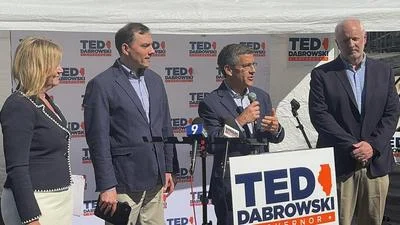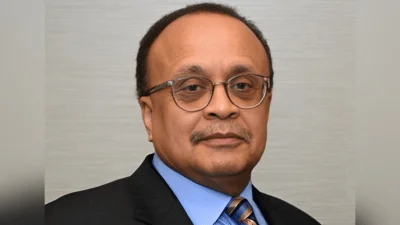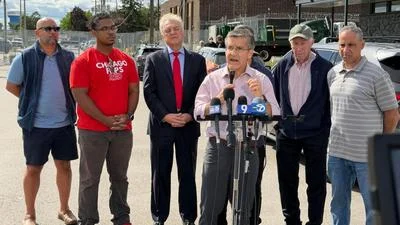Illinois State Board of Education, Performance Evaluation Advisory Council met Feb. 17.
Here are the minutes provided by the council:
I. Roll and Introductions
Mr. Frank called the meeting to order at 9:12 a.m.
| Kristen Adams | here |
| Adriana Arias | absent |
| Carlos Azcoitia | here |
| Dr. Angela Buckels | here |
| Dr. John Burkey | here |
| Eric Combs | absent |
| Rocio Del Castillo | here |
| Larry Frank | here |
| Dr. Jason Helfer | here |
| Michael Herring | absent |
| Chala Holland | here |
| Dr. Carrie Hruby | here |
| Dr. Lindsey Jensen | absent |
| Dr. Jeremiah Johnson | absent |
| Jim O'Connor | here |
| Dr. Courtney Orzel | absent |
| Anna Rose | here |
| Katherine Schumacher | here |
| Jodi Scott | absent |
| Dr. Bhavna Sharma-Lewis | here |
| Tara Stamps | here |
| Karen Triezenberg | absent |
Others in Attendance:
Meagan Budke-ISBE
Katie White-ISBE
Anna Mae Gram-Pullappally-Chicago Public Schools
Amy Alsop-Illinois Federation of Teachers
Alison Maley-Illinois Principals Association
Ben West-American Institutes for Research (AIR)
Jessica Handy-Stand for Children
Eric Larsen-AIR
Jen Figurelli
Vince Camille-ISBE
II. Approval of Minutes
Ms. Hruby made a motion to approve the minutes from the January 20 meeting, Ms. Adams seconded the motion.
| Kristen Adams | yes |
| Adriana Arias | absent |
| Carlos Azcoitia | yes |
| Dr. Angela Buckels | yes |
| John Burkey, Ed.D. | yes |
| Eric Combs | absent |
| Rocio Del Castillo | yes |
| Larry Frank | yes |
| Dr. Jason Helfer | yes |
| Michael Herring | absent |
| Chala Holland | yes |
| Dr. Carrie Hruby | yes |
| Dr. Lindsey Jensen | absent |
| Dr. Jeremiah Johnson | absent |
| Jim O'Connor | yes |
| Dr. Courtney Orzel | absent |
| Anna Rose | yes |
| Katherine Schumacher | yes |
| Jodi Scott | absent |
| Dr. Bhavna Sharma-Lewis | yes |
| Tara Stamps | yes |
| Karen Triezenberg | absent |
Minutes passed by roll call vote.
III. Public Comment
None.
IV. ISBE Update
Dr. Helfer updated committee members by reminding them that there is a new state superintendent, Dr. Tony Sanders. Krish Mohip will be serving as interim superintendent until Dr. Sanders transitions into the position on February 23. Dr. Helfer sent the link to ISBE’s Weekly Message in the chat that addressed a Senate resolution that had been previously discussed. He updated the group stating that in a meeting with Senator Kimberly
Lightford there was a conversation about evaluation as well as the work that the American Institutes for Research (AIR) would be doing to be sure that the data collected in its research would be a comprehensive look at educators throughout the state. He thanked the members of AIR for their upcoming work. Mr. Frank thanked Dr. Helfer for his update.
V. SR 774 – Question Development
Mr. Frank introduced the AIR item stating that “Question Development” will involve representatives from AIR starting with the questions developed and sent in by PEAC members, a discussion of the issues identified, and a conversation about how AIR can develop research methodologies to gather data that will inform our thinking about the issues and any recommendations we may want to make to ISBE after having seen and analyzed the data.
Mr. West received the contract but does not have materials to share today. AIR has looked at the questions, but it still needs more time to organize and set an action plan. It cannot move forward until there is a contract. Its action plan would be to map the questions and organize them to get responses to best suit the students of Illinois.
Mr. Frank asked the group members to confirm what they intend to get from the questions. His understanding was to use evaluation to help teachers improve their practice. Dr. Helfer confirmed that this is the goal as well as targeting the new career educators as well as veteran teachers. The goal is to get a wide range of experiences from a spectrum of teachers.
Mr. West stated that AIR wants to make sure that its research questions are very clear and targeted, so the results of the study can be used as reference in the future as well. Mr. Larson shared that he wants AIR to capture the variety of perspectives that are reflected throughout the state and in the questions. Mr. Frank asked what we can do to help with clarification as well as to help the process along. Mr. O’Connor asked for clarification on the timeline of AIR’s plan to gather, organize, and execute the study. Mr. West shared the timeline of the process that AIR has planned. Ms. Adams asked if that timeline could be shared with the group. Dr. Helfer confirmed it could be.
Mr. Frank asked members to share what is important to them and what they would like to see AIR consider when creating its action plan. Ms. Schumacher stated that she believes that questions were submitted and sorted into groups, and that the questions reflect teacher experience. She also noted that there are many specific questions about bias and the impact that it has on evaluations. Mr. O’Connor stated that teacher effectiveness is the No. 1 thing he would like to see focused on since that has the biggest impact on student achievement. He would like to see that focused on as well as educator growth and actionable feedback that will help improve practice. Dr. Holland shared that she would like to see how the evaluation system impacts beliefs surrounding students. She stated that students are influenced by what their teachers believe and would like to see a focus on diversity, inclusion, and equity. She would like to see how values and beliefs impact evaluations. Ms. Rose echoed Dr. Buckels’ thoughts about keeping student life-experience at the forefront and that student growth is a source of frustration for secondary education teachers. She would like to see how student growth can be considered. Ms. Del Castillo shared that bias is a concern as well as that there should be a focus on culturally relevant instruction. Evaluators need to consider the specialized programs and how that will affect teacher growth and the way that may look. Ms. Stamps echoed that bias is important to her as well as the impact of COVID-19 and the recovery that is taking place. In addition, she wants to see how the impact of trauma on teachers and students affects evaluation and student growth. Ms. Stamps shared anecdotes of different things that happen outside of the classroom and how they can be reflected and presented in the classroom. She stated that the student growth component can get tricky because numbers are not always the best way to measure teacher effectiveness and evaluating the whole educator. Dr. Burkey expressed interest in the growth component of evaluations, and it will be interesting to see what the study reveals. Looking back at this study 10 years from now will give us a lot of information and insight on what is effective. He explained the components of evaluation and how it morphs from being about student growth to the growth of a teacher. He stated that the goal is to have the evaluators spend more time with teachers who need to reach proficient or excellent status. Dr. Johnson highlighted that the areas of interest in his district are equity and inclusion as well as diversity and implicit bias. He is concerned about the perspective of the evaluation tool and how the growth component reflects on non-instructional teachers. Mr. Azcoitia wants the growth component to fill its intent as well as be used as a tool to close gaps that exist among demographics while also being mindful of the types of assessments that are being used. Another practical concern of his is the qualifications of the evaluators so that should be something that evaluators need to be cognizant of. In another vein, we must consider the suitability of the framework as it relates to systemic biases and being culturally sensitive, so we are not penalizing groups when the system is not built with them in mind. He cited specifically the decline in the number of Black educators and that it is a critical concern. The strain of the evaluation load is also a concern. Ms. Handy stated that Senator Lightford, said she was interested in hearing from teachers who have been dismissed through this evaluation system. The time spent in gathering evidence as well as prepping and uploading evidence is consuming on both the educator and evaluator end. Ms. Adams stated that it is important to hear from everyone in the evaluation process. She shared that it would be interesting to see the perspective of educators who were evaluated prior to the passage of the Performance Evaluation Reform Act (PERA) as well as post-PERA implementation. Covid doesn’t necessarily fit the Danielson model, especially in terms of collaborative learning. She noted that through this conversation two types of growth have been highlighted -- student growth and teacher growth. She stated that it will be interesting to see the data on that. Dr. Hruby noted that the time is one of the most precious resources she wants to hear the voices of teachers as well as administrators through this study. Ms. Grams Pullappally notes that there is a high need for evaluators because there is a high number of non-tenured teachers. And although there are flaws in the Danielson system, it is more than a checklist (which is what her experience was before Danielson). Ms. Stamps noted that Danielson has taken out some of the personalization of coaching and helping teachers be better. Mr. O'Connor stated that when he was a teacher, feedback was not a part of his evaluation. He expressed interest in seeing what other states are doing for their evaluation systems as well as what their student growth component looks like or if they even have one.
Mr. Frank stated that from the perspective of the Illinois Education Association, its stakeholders are split, some believe the Danielson Framework for evaluation is great, some do not. Coaching programs are a great way to take some of that load of evaluating off of the evaluators. Ms. Adams wondered if the student growth component is more acceptable and useful at the elementary level versus upper levels. Mr. Frank said that there are many ways that schools interpret how to utilize the student growth portion, but sometimes it does not have a large impact on informing instruction.
Mr. Larson summarized what he heard from the group and said that he has taken notes from the committee's perspectives.
Ms. Stamps thanked Mr. Larson for listening and for taking the time to understand the perspectives that were expressed. She also wanted to clarify that the evaluation system is working toward keeping teachers in the classroom and developing teachers into better educators and getting them the professional development needed to advance in their career.
Mr. Frank acknowledged and thanked AIR for the work it has started and will continue to do throughout this process.
VI. Training Committee Report
Ms. Alsop of the Illinois Federation of Teachers reported the training committee is working toward keeping the training pool robust and will be hosting new training in April as well as retraining during that time. The committee is working on updating the training to reflect the most updated Danielson model as well as updating research and videos in the Administrator Academies that will be presented. Mr. Frank expressed an interest in getting some feedback on the training and if there are resources that can be offered to evaluators.
VII. New Business
None.
VIII. Adjourn
Dr. Burkey made a motion to adjourn, and Mr. Azcoitia seconded the motion.
| Kristen Adams | yes |
| Adriana Arias | absent |
| Carlos Azcoitia | yes |
| Dr. Angela Buckels | yes |
| Dr. John Burkey | yes |
| Eric Combs | absent |
| Rocio Del Castillo | yes |
| Larry Frank | yes |
| Dr. Jason Helfer | yes |
| Michael Herring | absent |
| Chala Holland | yes |
| Dr. Carrie Hruby | yes |
| Dr. Lindsey Jensen | absent |
| Dr. Jeremiah Johnson | absent |
| Jim O'Connor | yes |
| Dr. Courtney Orzel | absent |
| Anna Rose | absent |
| Katherine Schumacher | absent |
| Jodi Scott | absent |
| Dr. Bhavna Sharma-Lewis | absent |
| Tara Stamps | yes |
| Karen Triezenberg | absent |
Motioned carried and the meeting was adjourned at 10:32 a.m.
https://www.isbe.net/Documents_PEAC/021723-minutes.pdf





 Alerts Sign-up
Alerts Sign-up